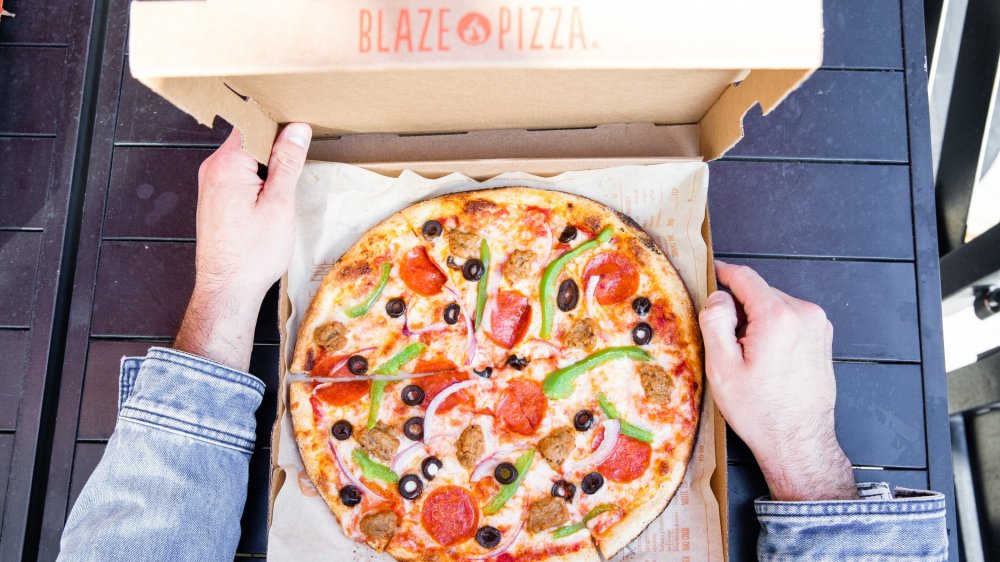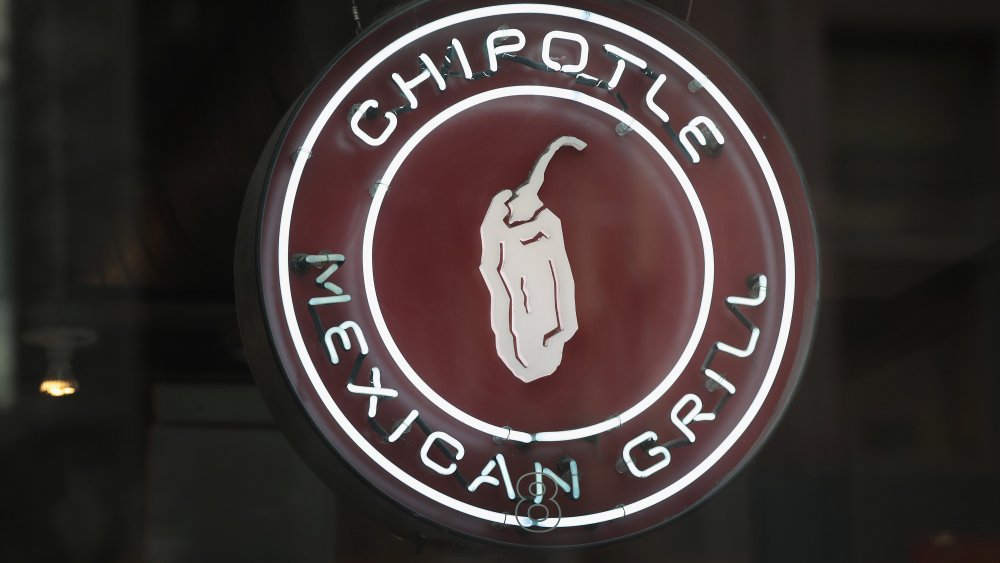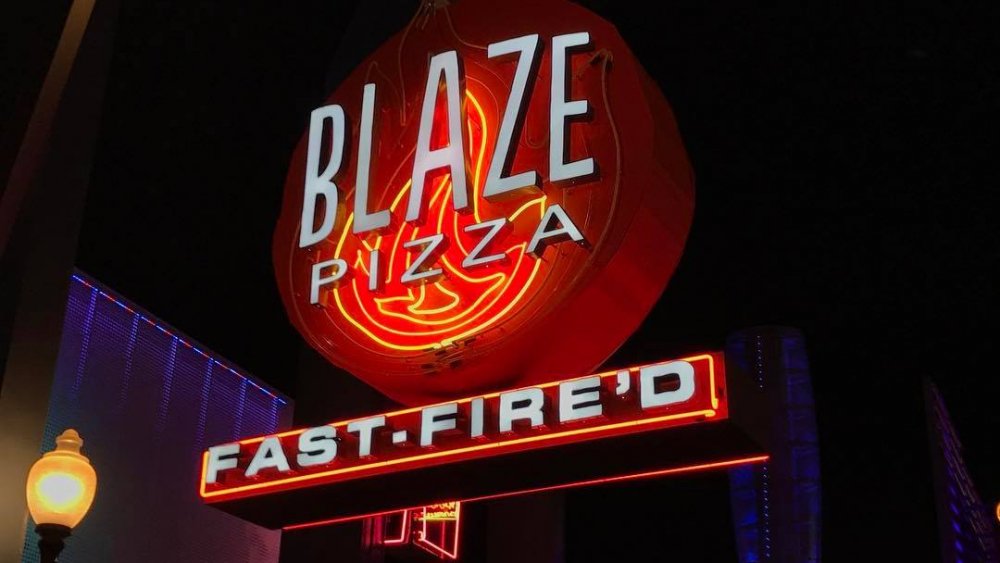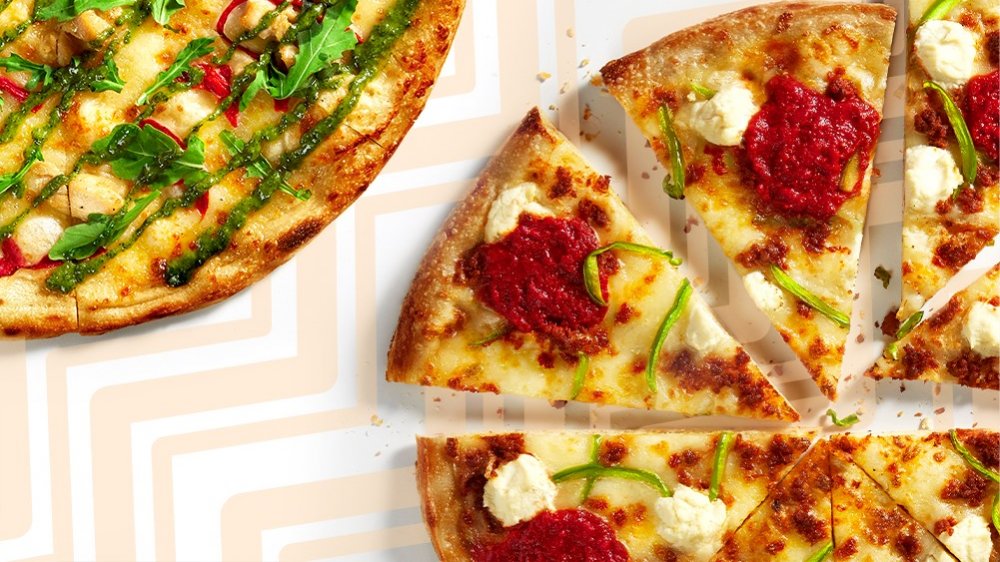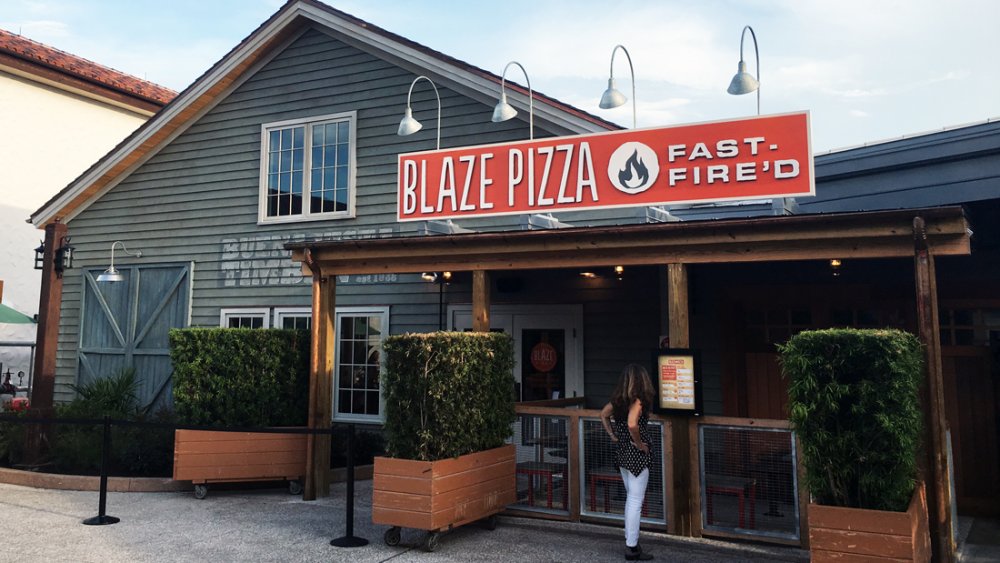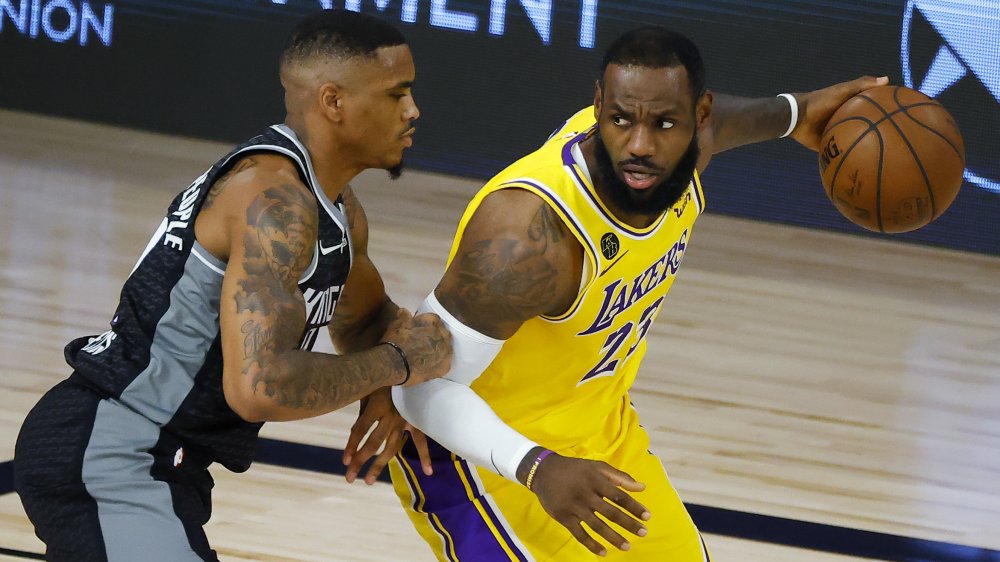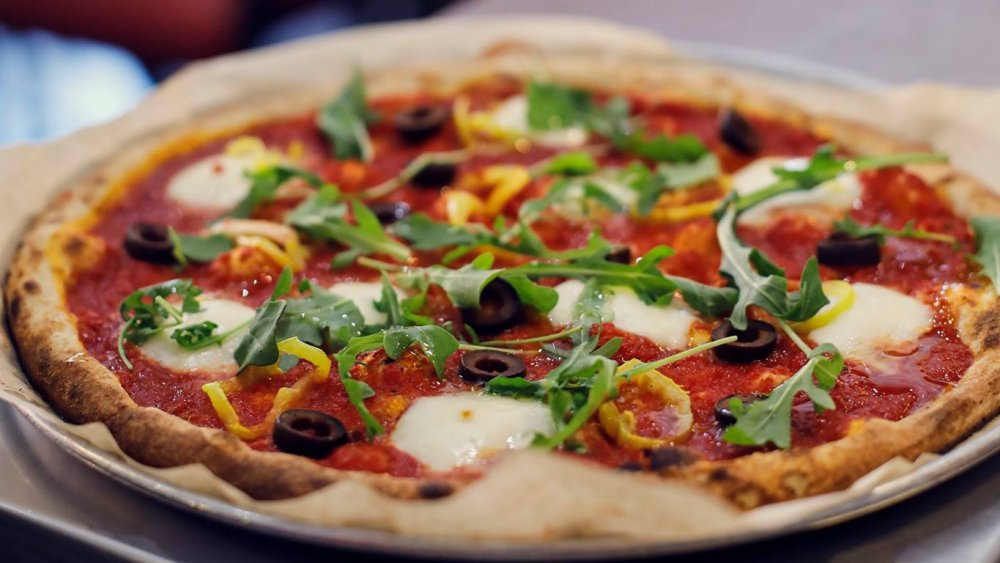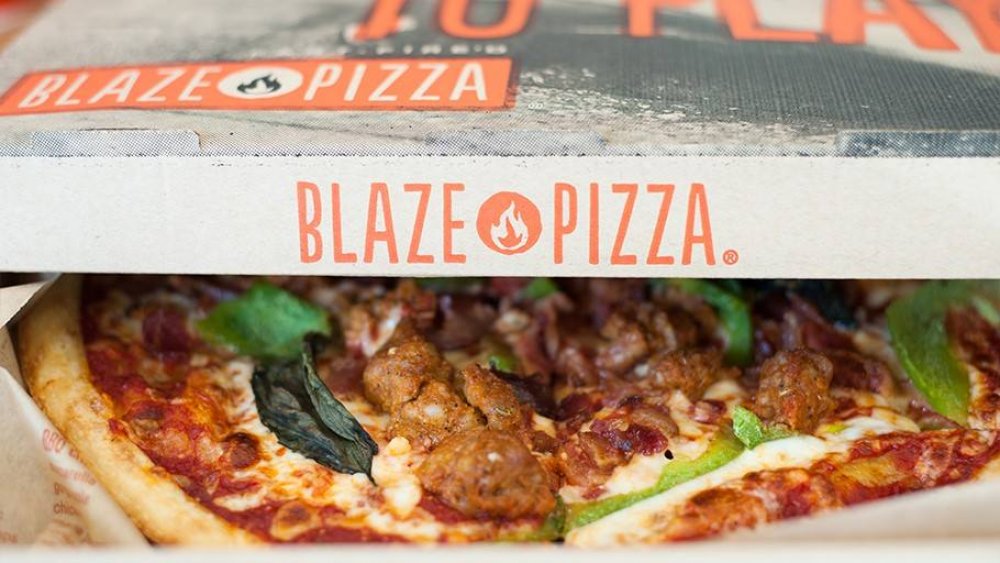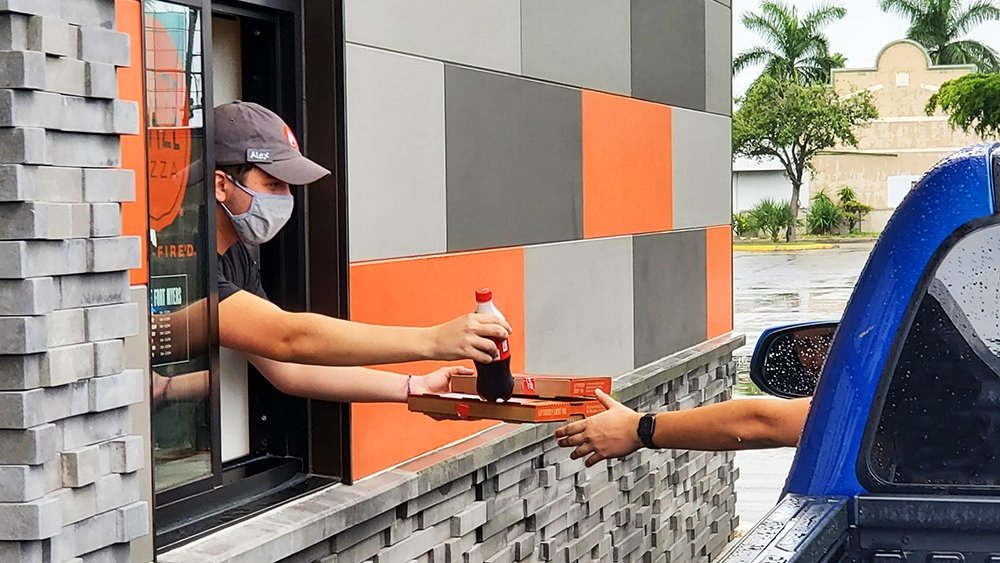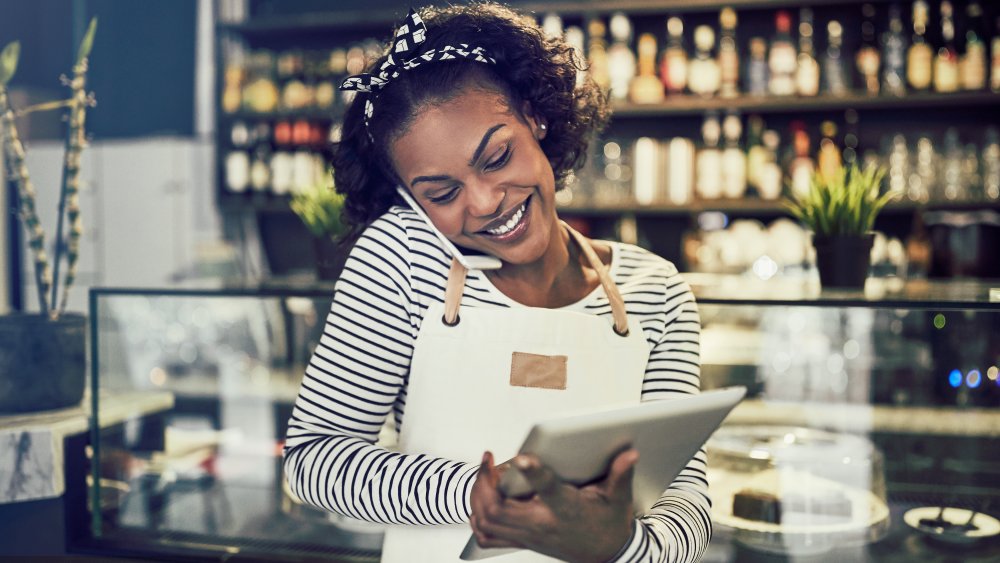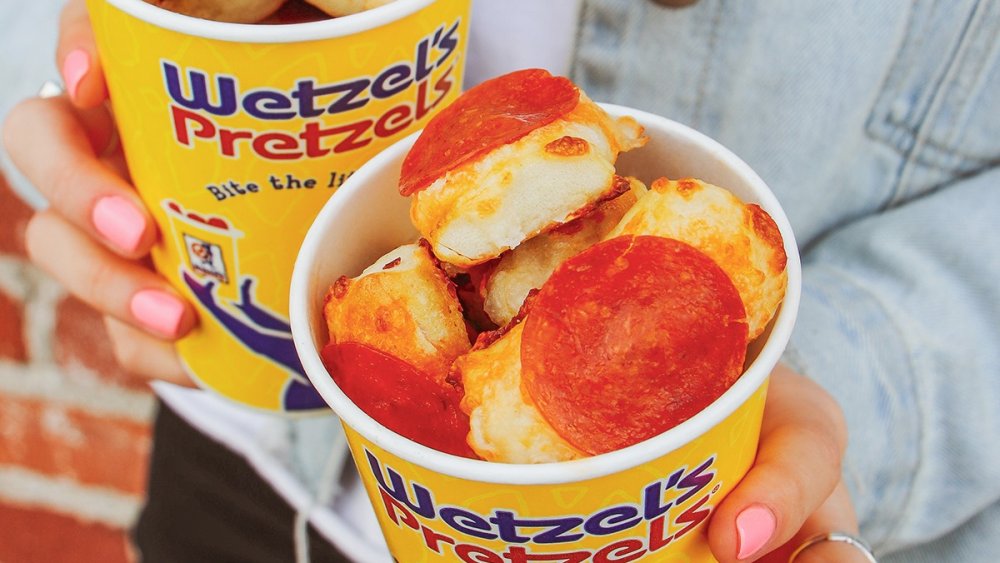Blaze Pizza Owners Dish On Working With LeBron James, The Secret To Their Dough, & More - Exclusive Interview
If you're a fan of Blaze, the pizza restaurant with the fastest growth in U.S. history (per Forbes), perhaps you've been curious about a few things. Such as, what is in this pizza dough, and why can't you stop after one slice? Or, maybe you've wondered just how the Blaze staff managed to assemble your carefully customized Build Your Own pizza almost as quickly as Chipotle peeps can heap beans and meat into a bowl. And, of course, the question on everyone's minds: why did NBA legend LeBron James decide to invest in Blaze?
In an exclusive interview with Mashed, Blaze founders Rick and Elise Wetzel answered all of these questions about their restaurant chain, which now has 300 locations. They also dished on what inspired the inception of Blaze nine years ago, the truth about what it's like to work with your spouse, how Blaze has managed to stay strong despite the pandemic–and what they think the next big food trend will be.
How a lunch at Chipotle inspired the Wetzels to open Blaze Pizza
What inspired you to open Blaze Pizza?
Elise Wetzel: We weren't looking to get into the pizza business per se... It was an accidental opportunity for us. We're big pizza fans and we live in LA, which is just a mecca of great food. We're really fortunate here. And so we love pizza, but it was lunchtime — we had a meeting and we wanted to stop for a quick bite. We wanted good pizza. We didn't want a reheated slice somewhere, something that had been on a heating lamp, and so we couldn't figure that out. You couldn't get fast pizza for lunch and we ended up at a Chipotle.
And as we're sitting there at this Chipotle, which we're also big fans of, and watching the customization, how it all could come together, we just looked at each other and said, "There's no reason why this couldn't happen. This is a perfect format for pizza. And can you believe it doesn't exist?"
When you think about it, as we started to dig into the opportunity and let it marinate a little bit, there are 75,000 pizza restaurants in the U.S. It's a very saturated category so it seems like it would be hard to enter, but we threaded the needle in such a way. There was no good artisanal pizza, fast for lunch. So that was really the inspiration.
Rick Wetzel: And all of our friends said, "Are you crazy? You're going to enter the pizza category?" We're like, "No, no, no. We know exactly what we're doing." But we'd done a concept before. We had done Wetzel's Pretzels and that's a mall-based business. So we knew dough and we knew how to expand, and we knew how to market a brand and all those wonderful things. And we thought, let's just apply this to the pizza category, except let's take it up a notch and let's make it something.
We put one of the restaurants, we opened two at the same time because we knew it was a really good idea and I didn't know what kind of real estate to take. So we built one down next to University of Irvine and we built one here in Pasadena in sort of the downtown business district. And that one, being close to where we live — we said, we know that all our friends are going to go into it so this better be really, really good, or we're going to really embarrass ourselves bad. And so it really set the bar high.
So at every turn we tried to execute at a really high level. So we built it with purpose. We built it with really good food. We built it with clean food. We wanted to build an ambience that people really connected to. We like to say it's getting a thousand little dials set just right.
The Wetzels had big goals when they first opened Blaze Pizza
So what was the biggest challenge you faced getting Blaze to where it is today?
EW: Well, one of the things I would say is that there are a thousand little dials that had to be set just right. There's a very famous expression, "retail is detail," and that's certainly the case in the restaurant industry. Our career is from packaged goods where you work with grocery store shelves, and this is much more of a three dimensional marketing or consumer guest experience. You get to smell things, hear the music, look at the tables and the choice of furnishings, the finish on the floor. So the challenge at the beginning is getting all of the dials right, and then importantly, the challenge is when you leave one location and you start expanding, how do you carry the richness through without making it look chain-ified or sterile, or really just losing its soul.
We celebrate individuality at Blaze. Each restaurant is unique. So each one of these hundreds of restaurants that we've built, we would have Anna... and the design team look at it and put unique moves on it. So the wall graphics that celebrate individuality and give people statements, positive statements, each one's different. And so I think that was the trick.
What we do is we take excellent, artisanal food, and we make it accessible. It's like a democratization of food. We make it affordable. We make it fast. Those were the things that we couldn't get at that lunch. And we want to make that environment just as good as you would get at a nice restaurant, but just make it more accessible, and scaling that up was the thing to figure out. That was hard.
I'll add one other thing to that, and that is the journey to clean food, because we have always envisioned that we would have a restaurant that was free of artificial colors, flavors, and ingredients, and that was hard to do when you had one location. We didn't have the leverage with our suppliers. And so, one of the hardest things and most important things and rewarding things we did is we worked on that journey with our suppliers and completely cleaned up our menu. I think in the beginning, when I think we had about 30 restaurants and finishing before we had 100, we'd completely cleaned up the ingredients well before any of these other chains had done it.
RW: So, we always knew what was going to be a moonshot. We knew from the beginning, and we spent about a year mapping this thing out before we opened our first restaurant, but we said, "We're going to build a thousand restaurants and how do we do this and make them all unique and hold that spirit inside of each one and do all the things we want to do and do it across the country, and that was going to go very fast."
And so along the way, it was really built on people. We did a really good job. Every time we bumped into someone who got excited about our journey and who was talented, we would pull them onto the team, even if we didn't have a spot. And we hired a lot of people early on just because we loved their enthusiasm and their talents and we would put them into boxes that they didn't even belong in, but there's these original OGs, we call them, that really helped us to get this thing off the ground.
And maybe one of the most frustrating things was just, early on, we knew it was going to be a very competitive category as anything that... Because the internet, everything spreads instantly so the minute a good idea hits the ground that everyone hears about it, and so you get a lot of competition. So we knew we were going to have to outrun everyone. So there was a period in there for two or three years where it was hard to break out and really stand apart and convince landlords that we were the one that you wanted and not this other guy down the street. And so it was a little frustrating through that period.
The secret reason why Blaze Pizza tastes so good
What makes Blaze Pizza taste so delicious?
EW: I mean, it's the dough. It's the dough. It's Chef Brad. We call him the pizza whisper. He's been working on pizzas for his entire career, but the secret to ours is this 24-hour fermentation period.
So we make the dough and then we set it aside. We refrigerate it for 24 hours, and during that time the flavors really come out. And we serve it and it's a very thin crust, but it's really that fermentation that makes the pizza really easy to digest. So when you have this light-as-air feeling. You don't walk away from Blaze feeling full of regrets.
So Blaze Pizza is good for your microbiome?
EWl: Absolutely, easily digestible. It's the fermentation period that it goes through. So that's the secret, but it takes time and not a lot of concepts will put that kind of time into the marination of it all.
Opening a Blaze Pizza in Disney World was Rick Wetzel's childhood dream
What is the best Blaze Pizza location?
EW: Oh, well we have a couple of flagships, and my favorite is the one at Walt Disney World. That was a really special opportunity for us. It was a ground-up build and it is arguably the busiest pizza place on the planet. And to think that we went from Rick and me and a chef and an architect at the origins to be able to create this thing and tell this story, that's one that I think we're especially proud of.
RW: I've always loved Disney. When I was younger, I worked at Disneyland on driving the Jungle Cruise boat. And so I just have always really understood how Disney operates and how deep they build their storylines into everything that they do. And so for us, when we built this restaurant, as Elise said, from the ground up, it gave us a chance to imagine the building, what it was. And the storyline we were given was, we said, "You're building in a town that's 150 years old, build a storyline underneath it."
So we said, "Okay, the building was at the old saw mill 150 years ago, and it got added onto two times over the years, it stayed in the family and eventually it got passed down six generations until the sixth generation runs a pizza restaurant in it." So that's sort of the storyline, but when you look at the architecture of it, we built the building with three different styles of architecture and you can literally see the additions as they were put on and the styles of wood and the styles of fastening them changed throughout the building. Yeah, and it was all built in one big motion. So it's a real special one.
EW: It's making me pause. I mean, Disney is the one that we're the proudest of, but I'd say the one we have the greatest emotional connection to is the one in our own community [Pasadena] because... that's where the company was born and we've spent so many hours obsessing over the kind of trashcan that goes in the restroom. We seriously obsessed over details like that. And we know the crew there very, very well, and that was sort of a home for all of our franchise partners as they came through, so that one is like our second home.
So you're torn between Disney World and Pasadena?
RW: We love all of our children. We love them all. Every one of them is a little bit unique. We said, "We want each restaurant to kind of have a soul to it, and then when you walk into it, you kind of feel like you belong there and you don't know why. And this is kind of the stuff that you learn at Disney. You bake enough of the storyline in, like there are parts of the store that have darker wood and that's because it was burned from the flames. So everything sort of has a little story to it. And when you walk in, you can feel it and you don't know why. And those are the things that you bake into a restaurant that makes them special. So we love them all.
How long had Blaze been around before the Disney World location was built?
RW: We're only eight years old and I think it's probably three or four years old. So I think we secured that one pretty early on in the process.
We're really good at explaining our story and getting people excited about it. So that happened to be a property that was coming out of the ground. They built the new Disney Springs and we knew the folks down there and they knew us. And so we were able to connect up and really explain the vision of what we were going to do. And we went through a lot of iterations and a lot of pitches and a lot of feedback before we finally landed on it. It's funny because we have this wonderful restaurant designer named Anna Hinton... who touches every one of our restaurants, but she was so good at spinning the story. When she ultimately took our story back to Disney and pitched the whole idea of it being 150 year [old] saw mill, she was so good that they looked at her and said, "I want you on our team." We said, "No, you can't have her."
So it was hard to get a restaurant location in Disney Springs?
RW: Oh no, you can't just go in there and lease it. You have to fit what they're looking for. And they're so good that if you're a third party operator and you're on their property, you have to operate as if you're Disney. So the standards that they have for you are the same standards for themselves, and it's a really high standard. And we love actually operating at that level because it just gives us a great level to work up to. It's the busiest pizza restaurant on the planet.
LeBron James brought new energy to Blaze Pizza
How did LeBron James' investment in Blaze Pizza help grow your company?
RW: And that's really where LeBron James came in because he helped us to stand apart from everyone else. So at least I had this one chip. We could say we do all these wonderful things and do them really, really well, but, oh, I've got LeBron James on my team. And they go, "Well, you must be special because nobody else has LeBron James on their team."
What is LeBron James like as a colleague?
RW: Well, he does what he says he's going to do. I think he's very sincere. He's exactly what you think he is. What you see is what you get. And I love his personality. I love... his activism because he's actually aligned with how we feel as an organization too, so he's good like that. He's really supportive of us. And like we just launched large pizzas last year and he shot a video for us that went viral. I mean, he's always been good about doing stuff like that. So he's always there for us and he helped us be bigger than we really were when we were little.
Why did LeBron James get involved with Blaze Pizza in the first place?
RW: He was introduced to us through my original angel investor [from] Wetzel's Pretzels, and so he brought LeBron into the deal. And then he was originally just an investor. And then a little bit later on he had his endorsement deal with McDonald's, and somewhere in there, he decided to exit that deal and they approached us and asked us if we wanted to go all in, that he was excited about Blaze.
And so I don't want to put words in his mouth and tell you how it all happened from his side, but we were really excited about actually getting an endorsement deal with LeBron. So he's all in. He's a part owner of some restaurants, he is an active investor and he also has an endorsement deal with us, so he's sort of a three-pronged asset to us.
EW: I will just echo everything that he does is completely authentic, it's him. We don't tell LeBron what to tweet. This is all from his heart. And so I think that, I mean, he's a perfect brand ambassador for us and he is the real deal.
What is LeBron's favorite Blaze Pizza?
RW: It's actually on the internet. He ordered one once and he's snapshotted at it and send it out and it got all kinds of coverage. And I think even on ESPN, they dissected it. I think there's like 16 different things on it.
EW: We had a lot of fun with the goat cheese he put on it.
RW: The greatest of all time.
What the Wetzels order when they eat at Blaze
What do you eat when you're at Blaze?
EW: Well, I mean, sometimes I get in line behind Chef Brad and just do whatever he's doing that day. But my go-to is probably the Red Vine because it's just, it's clean, it's simple. One of the important differences with Blaze is that we make our dough in house, fresh. So there are no frozen dough balls. There are no preservatives. You can taste it. And that's why I like the red vine because you can just really taste the lightness of the dough.
RW: We have the advantage of, we created the original menu when it was just a PowerPoint deck. And so there are eight signature pizzas that we got to design. So those are our eight favorites right there on the menu board, and they're still there today. And then a Build Your Own is always fun. You just can't really go wrong with that.
Blaze Pizza founders' advice for restaurant entrepreneurs
If you could give one piece of advice to someone who wanted to start their own food chain, what would that advice be?
RW: God, it's so different today because it's almost like opening a restaurant has become like art, and these kids today, they're all tatted up and they're so creative. I couldn't even imagine trying to compete with them today!
I do think we're probably one of the last big chains that's ever going to come out of the ground because there are so many good independents coming out now that I think that's the next wave. But follow your heart, follow your passion. I'm very big on having a partner. I've had a partner in every business I've ever done. Have someone there with you to carry the weight when you're tired or have bad ideas or whatever, have someone there with you. And I don't know, just be passionate about it.
EW: Yes, my advice would be to do it, chase it, but pay attention to all of the details, details matter, and grow it up over time. Follow your dreams. Pour your love into it. And I do agree with Rick. I don't think your goal should be to make a chain and "I'm going to have world domination with this thing that I'm creating." The guests will tell you and give you permission to grow.
So if you're doing well, you'll have permission and your concept can expand. So be approaching it more with the love of the food and the love of the service to the guests, and the rest will follow.
RW: And don't look for the exit. I mean, that's the transaction at the end. Just do it and love it and make it. It's not about a transaction at the end.
Blaze Pizza has survived the pandemic because it was set up for online ordering
How has the pandemic impacted Blaze Pizza?
RW: Well, on the business side, we had since the very first restaurant, have been thinking about having an off-premise business. So we've always put it in this second make line in the back of the restaurant. And we've built all the digital infrastructure and everything. And really going into COVID, and having to shut down the dining rooms, really moved the company over and we have been really focused on our off-premise business, but the whole infrastructure was there.
So we've gotten very, very good at digital ordering and delivering and carry-out and all those things. So on the plus side, once the dining rooms open back up, we're going to have a really, really robust off-premise business. So we're excited about that. But sadly, a lot of people have lost jobs over it. The restaurants run with fewer people than they used to, and we've lost some very dear employees over it, or team members.
EW: I would echo that because we, in the past two years, have really leaned into digital and built that up... We adjusted our sales in advance, and because of that, we were able to tack a little differently and whether this [was] better than some other concepts may have. For example, our app. We had built that app and we've got a nice following and I was just commenting, it's helpful because you're able to have this direct dialogue with loyal followers and be able to encourage them to come back. If we didn't have that kind of communication, it would be harder. So we're doing fine through it.
RW: But it's hard being in an industry where we're all peers, and seeing so many restaurants fail that aren't going to come back. That's hard to see. And we've been fortunate that we're going to get out the other side, but a lot of people... A lot of independents aren't going to come back and it's hard to see entrepreneurs failing over something that wasn't their fault. And just in our hometown of Pasadena, I've seen so many restaurants go out that I know aren't going to open back up, and it's heartbreaking, it really is.
Has the pandemic influenced the kinds of food people are now ordering at Blaze Pizza?
RW: A lot of beer.
EW: Personally, we've just been a lot less vigilant about [being] healthy... It's not as important right now to people.
RW: We had just launched large pizzas because they're better for off-premise and shareable format so we've had a huge business in that as well. But pizza's a go-to. People love ordering pizza, so it's... I mean, that's kind of what they're headed to.
The Wetzels think independent restaurants are going to become more popular after the pandemic
What do you predict will be the next big food trend?
RW: Well... my partner from Wetzel's is doing another concept now called Dave's Hot Chicken. It's a Nashville hot chicken sandwich chain and they've got four of them here in LA and doing extremely well. And that's really exciting, but it's craveable, it's simple. It's a very focused menu, really tight guard rails, and popular with the kids. They line up. They line up to buy them.
Any one of the restaurants, at any moment, there's probably 15 or 20 people in line waiting to get inside. So that's one. I don't know any other food trends other than just these independents, which I think once we get out of it... You're going to have to get out of COVID. But more exotic flavors, more chef-inspired stuff, more unique things put together. I think that's sort of the trend.
Blaze Pizza has been good for the Wetzels' marriage
Has it been easy to work with the person you're married to?
RW: Yes.
EW: It's been great.
RW: And she's my best friend, but we do have our lanes. We have our lanes and we've always identified with our lanes. I'm more like process and structural stuff and she's always been the marketing person and the food side of the business. So we've learned how to stay in our lanes. I know never to walk into her office and look down on her desk and make a comment about anything that I see sitting there because she doesn't want to hear it, not from me. She can hear it from someone else, but not from me. So we've learned that really well. And even here at the house, we have separate offices, so we don't sit in the same office just so we don't get on each other's heads too much, but we love working together. It's been really, really, really fun.
EW: I couldn't imagine having gone on this journey without Rick. It was definitely a journey that we embarked on together from the inception of the idea, we came to the idea together, and we've worked on it side by side for eight years now. And if either one of us had done it without the other, that would have been a loss for the person left out, so I'm so happy that we did it together.
And it all was inspired by you eating lunch together at Chipotle, right?
RW: Yeah. Yup, yup.
Owning Wetzel's Pretzels helped the Wetzels achieve breakout success with Blaze Pizza
Were there any lessons you learned from founding Wetzel's Pretzels that helped you be successful starting Blaze Pizza?
RW: Just the whole process of starting a business and learning how to scale it was very helpful. And then working with dough and building a Rolodex and learning how to franchise and learning how to get good real estate, that kind of stuff. It's about building filters and bringing that over. We knew that we were going to have to go very, very fast and had to build a really, really good foundation in Blaze for it to be a dominant brand out there and to be what we wanted it to be.
Did you choose pretzels because your last name is Wetzel?
RW: Sure, yeah.
EW: We actually had huge debates over what to name the company, and it was a third person who suggested it. An outsider suggested it.
RW: Yeah, it was the last thing we came to, but it's a fun name. And when I was a kid, I was always called Wetzel pretzel. So at least for my kids, at least when someone calls them, "Hey, Wetzel pretzel," at least it's an endearing term now, not a mean snipe at you.
